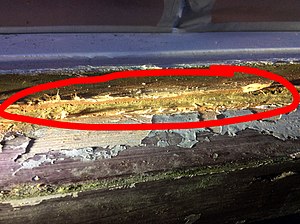
Abstract[edit | edit source]
Arlen Spector is trying to help out people affected by asbestos. Hopefully this will end asbestos litigation. He is trying to get compensation for people that need it and never got it. Asbestos sometimes shows up years later and by the time you find out you have it, there's nothing you can do about it. It is a thoughtful purpose to carry out and if it works, many people will be thankful. There are however some problems like any bill that is proposed. Hopefully things will work out. --Pmthomas99 10:08, 26 October 2007 (PDT)
Senator Arlen Specter's Asbestos Trust Fund Bill[edit | edit source]
May 2005 - - The FAIR Act of 2005 (S. 852/H.R.1360) is a national asbestos lawsuit settlement bill co-sponsored by Republican Arlen Specter of Pennsylvania and Democrat Patrick Leahy of Vermont.
What the Bill Will Do[edit | edit source]
The bill will take asbestos victims claims out of the court system and force them into a federal trust fund. The $140 billion national settlement is being structured to end asbestos litigation. Without a national settlement, victims of asbestos exposure face dwindling legal options. Most can't sue in their own state's courts because illness caused by asbestos exposure may not show up for decades and state laws often require a person exposed to a toxic substance to sue within a few years of exposure. Abestos-related disease doesn't show up for decades.
Improvements Being Made[edit | edit source]
- increases in award levels for some disease categories
- a bar against any liens on workers compensation
What People Think[edit | edit source]
The Committee to Protect Mesothelioma Victims (CPMV) and the AFL-CIO oppose the bill. They believe the bill has a number of serious deficiencies that must be corrected despite recent changes that came as a result of stakeholder negotiations on the bill. Proponents and opponents support the establishment of a federal asbestos trust fund to compensate asbestos victims for their injuries through a no-fault system to replace the present civil litigation system. It is the level of funding in the bill that is in dispute. The AFL-CIO believes the fund would go broke before all victims had a chance for compensation. Both groups agree that federal legislation is necessary to deal with the high volume of litigation stemming from asbestos disease across the country, According to opponents, the bill has a number of serious deficiencies that must be corrected. These include:
- The elimination of compensation for a large group of lung cancer victims without allowing these individuals to document asbestos exposure through CT scans
- The absence of remedies for victims during the startup period before the Fund is able to pay claims.
In addition, there are a set of issues, such as the statute of limitations, preemption and the treatment of claims if the Fund sunsets, that will determine whether the compensation system works as intended for deserving claimants. In 1979, lawmakers tried to correct the contradiction, but courts ruled that asbestos exception only applies to workers exposed after the law passed. By 1979, most workplaces had stopped using asbestos products.
Some conservatives believe the $140 billion "Asbestos Trust Fund" will simply grow government, raise taxes, and line the pockets of trial lawyers under the guise that it will help victims of asbestos related illness.
What is Asbestos?[edit | edit source]
Asbestos is a fibrous mineral that has been used as insulation and a fire retardant in a wide variety of products. Because of its durable, fibrous nature, asbestos can produce dust that, when inhaled, becomes deposited in the lungs. Asbestos in the lungs can cause or contribute to the development of illnesses including asbestosis (a fibrous scarring of the lungs) and mesothelioma (a malignant form of cancer in the lining of the chest or abdominal cavities). [1]